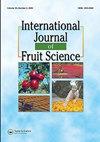The Response of Three Mandarin Cultivars Grafted on Sour Orange Rootstock to Salinity Stress
IF 2.4
3区 农林科学
Q2 HORTICULTURE
引用次数: 0
Abstract
ABSTRACT Citrus growth is often constrained by salinity, but citrus rootstocks respond to salinity differently. A greenhouse study was carried out in a completely randomized design with three cultivars of mandarin (‘Younesi,’ ‘Clementine,’ and ‘Yashar’) and four levels of salinity (control, 1, 3, and 5 dS/m) in three replications to explore the mechanism by which salinity stress affects photosynthetic and growth factors of mandarin cultivars. After applying salinity treatments, shoot fresh and dry weight, root fresh and dry weight, branch number, leaf number, plant height, leaf and root potassium (K), sodium (Na), and calcium (Ca) contents, chlorophyll content, proline content, leaf nitrogen, and protein content, electrolyte leakage, and sugar content were measured. The results showed that salinity stress reduced vegetative and photosynthetic factors in all three cultivars. Root and leaf K and Na contents, chlorophyll a, total chlorophyll, proline content, electrolyte leakage, and sugar and protein contents were affected by cultivars. Salinity affected root and leaf K and Na contents, chlorophyll a and b and total chlorophyll contents, proline, and electrolyte leakage significantly. The interaction of cultivar and salinity was also significant on chlorophyll a and total chlorophyll contents, leaf N and protein contents, and electrolyte leakage. Salinity stress reduced vegetative and photosynthesis factors of all three cultivars.3个柑桔嫁接品种对盐胁迫的响应
柑橘的生长经常受到盐度的限制,但柑橘砧木对盐度的反应不同。以3个柑桔品种(“尤尼斯”、“Clementine”和“雅沙尔”)为材料,采用完全随机设计,在3个重复的4个盐度水平(对照、1、3和5 dS/m)下进行温室试验,探讨盐度胁迫对柑桔品种光合因子和生长因子的影响机制。施盐处理后,测定茎部鲜干重、根鲜干重、分枝数、叶数、株高、叶和根钾(K)、钠(Na)、钙(Ca)含量、叶绿素含量、脯氨酸含量、叶片氮含量、蛋白质含量、电解质泄漏量和糖含量。结果表明,盐胁迫降低了3个品种的营养因子和光合因子。根系和叶片钾、钠含量、叶绿素a、总叶绿素、脯氨酸含量、电解质泄漏、糖和蛋白质含量受品种影响。盐度对根和叶K和Na含量、叶绿素a和b、总叶绿素含量、脯氨酸和电解质泄漏有显著影响。品种与盐度的互作对叶绿素a和总叶绿素含量、叶片氮和蛋白质含量以及电解质泄漏也有显著影响。盐胁迫降低了三个品种的营养因子和光合因子。
本文章由计算机程序翻译,如有差异,请以英文原文为准。
求助全文
约1分钟内获得全文
求助全文
来源期刊

International Journal of Fruit Science
Agricultural and Biological Sciences-Agronomy and Crop Science
CiteScore
6.40
自引率
0.00%
发文量
64
审稿时长
10 weeks
期刊介绍:
The International Journal of Fruit Science disseminates results of current research that are immediately applicable to the grower, extension agent, and educator in a useful, legitimate, and scientific format. The focus of the journal is on new technologies and innovative approaches to the management and marketing of all types of fruits. It provides practical and fundamental information necessary for the superior growth and quality of fruit crops.
This journal examines fruit growing from a wide range of aspects, including:
-genetics and breeding
-pruning and training
-entomology, plant pathology, and weed science
-physiology and cultural practices
-marketing and economics
-fruit production, harvesting, and postharvest
 求助内容:
求助内容: 应助结果提醒方式:
应助结果提醒方式:


